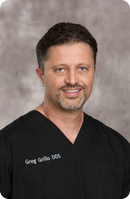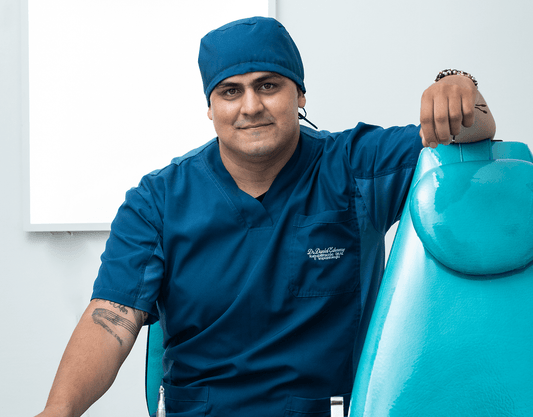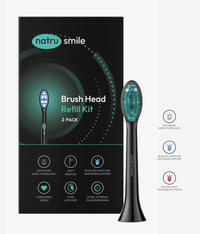
All products are certified by dental expert Dr. Greg Grillo
In this one-on-one interview with Dr. Daniel Echeverry, we sat down to discuss his professional background, motivation to pursue a career in dentistry and prosthodontics, and how he stays at the forefront of the industry.
He also talks about how he navigates patient interactions and the most important facets of oral health care. Read on to learn more about Dr. Echeverry and his unique story.
About Dr. Daniel Echeverry
Dr. Daniel Echeverry, a distinguished specialist in Prosthodontics, brings his expertise in dental implants, dental crowns, total dentures, and aesthetics to his private practice in the vibrant city of Medellin, Colombia. His extensive experience in private practice is complemented by an innate humility and sensitivity, qualities that guide his approach to patient care. Echeverry's mission extends beyond the technical aspects of his work – he is deeply committed to restoring functionality and aesthetics for all of his patients, enhancing their quality of life.
Away from the clinical setting, Echeverry leads an active, fulfilling life. He relishes time spent with family, cherishing the bonds and memories formed through shared experiences. Travel forms another significant part of Echeverry's life, offering opportunities for continued learning and cultural exploration. Music, too, holds a special place in his heart, providing both relaxation and inspiration.
In Dr. Echeverry, patients find more than a highly skilled prosthodontist. They find a compassionate professional who values the personal aspects of patient care as much as the technical. Whether he is restoring a smile in his practice or exploring new destinations with his loved ones, Echeverry embraces life with positivity and enthusiasm. His dedication to his profession and commitment to balance in his personal life make him a respected figure in his field and community.
What motivated you to become a dentist? Was there a particular experience or influence that inspired your career choice?
When I think about it, I always had an affinity for the health sector. When I was growing up, my father, who is a talented dental technician, would often involve me in his work. I would eagerly help him out, fascinated by the intricate dental procedures and the artistry behind creating dental appliances. It was during those early years that my passion and calling for this field really took hold. The experiences and knowledge I gained alongside my father not only shaped my career path, but also gave me a deep appreciation for the importance of oral health and how it impacts overall well-being.
How do you stay updated with the latest advancements and trends in the field of dentistry? Can you share any recent courses, conferences, or publications that have influenced your practice?
Yes, I'm always seeking new knowledge and skills. To keep up with the latest developments, I make it a point to attend conferences and congresses on prosthodontics, periodontics, and aesthetics. Recently, I had an amazing opportunity to be part of the international congress organized by the Colombian Association of Prosthodontics (ACP). It was such a rewarding experience where I got to learn from industry experts and connect with fellow professionals. These events are my favorite way to broaden my expertise and keep me in the loop with the latest advancements prosthodontics.
In your opinion, what are some of the most significant technological advancements that have revolutionized dentistry in recent years? How have these advancements impacted your approach to patient care?
One of the most groundbreaking advancements in my field has to be the intraoral scanner. This amazing device has completely changed the way I work, bringing a whole new level of precision, efficiency, and patient comfort to my practice. By capturing detailed digital impressions of the mouth, the scanner ensures unmatched accuracy in creating fixed prosthetics.
With the rise of tele-dentistry and virtual consultations, what are your thoughts on the future of remote dental care? How do you see this technology influencing the dental industry in the coming years?
Having a virtual dental consultation for anything related to diagnostics is quite challenging. There will always be things that require in-person visits. While X-rays and photos can help with an approximate diagnosis, they only add context to what the dentist sees in person. So, we still have a lot to do!
The COVID-19 pandemic has significantly impacted the healthcare industry. How has it specifically affected dentistry, and what changes have you implemented in your practice to adapt to the new normal?
COVID-19 really messed up dental care for a lot of people, especially those in the middle of treatments. Dentists had to jump through hoops with all those biosafety protocols, following the health guidelines of each country. We were basically on the front lines, dealing with the highest risk of catching that darn virus.
Cosmetic dentistry has gained popularity in recent years. Can you discuss some of the most common cosmetic procedures you perform and the impact they can have on a patient's confidence and self-esteem?
When it comes to dental aesthetics, smile design is what patients in Latin America are really after. In my line of work, I find myself focusing on direct and indirect veneers, along with careful planning, during consultations.
Dental implants have become a popular choice for replacing missing teeth. Could you explain the implantation process and discuss any advancements or innovations in this field?
Dental implants are an excellent option for replacing missing teeth. Sometimes, they are the only option. They involve a titanium screw that goes into the bone and requires a healing process. This screw acts as a dental root, and later an abutment is screwed onto it, serving as a foundation for the future crown or prosthesis. The all-in-4 system is a remarkable advancement because it allows you to replace an entire arch with just four implants. Pretty cool, right?
Can you describe a particularly challenging dental case you have encountered and how you approached its treatment?
For patients with severe parafunctional habits like bruxism and a noticeable loss in the vertical dimension of occlusion, it's important to approach treatment with patience. Since these patients have muscle memory, we have to use techniques like neuromuscular relaxation and sound occlusal principles to help them achieve balance in their bite.
The first step is gradually increasing that dimension until the patient is satisfied, using provisionals. Once we achieve more stability, we can pursue definitive treatment.
How do you handle patients who have dental phobia or anxiety? Are there specific techniques or approaches you find effective in helping them overcome their fears?
The main reason patients have dental anxiety is that they've had a previous bad experience at the dental office. Sometimes, dental work can be uncomfortable or scary, but it's important to reassure patients that we're here to make them feel comfortable and safe.
I always take time to talk with my patients, explain all the procedures in detail, and make sure they are comfortable before proceeding. The key is always listening to them and sharing your own experiences to make them feel more at ease with you.
How do you prioritize preventive dentistry in your practice, and what strategies do you use to educate patients about the importance of regular check-ups and cleanings?
The key to prevention is making sure you stay on top of regular cleanings and check-ups, even if you don't notice anything wrong. For me, it's all about working together as a team with the dental assistant or whoever handles your appointments. They keep me organized with preventive visits and remind me to talk to my patients about the importance of proper hygiene and healthy habits.
What advice do you have for patients seeking to maintain optimal oral health between dental visits? Are there any specific at-home care routines or products you recommend?
My biggest recommendation for maintaining good oral hygiene is to use proper cleaning techniques. That includes how and how often you use your toothbrush, floss, and mouthwash. Brush your teeth twice daily for about two minutes, and use an electric toothbrush if possible. You also have to attend regular check-ups with your dentist. Ideally, once every six months.
You should also be mindful of certain foods that negatively impact your dental health. For instance, hard sweets can fracture your teeth, while foods high in sugar content can cause cavities faster than you think.
Dr. Echeverry endorses NatruSmile products as safe and effective solutions for at-home whitening and oral care. NatruSmile's line of toothpaste, mouthwash, whitening products, and flossing tools are designed to promote healthy teeth and gums while still tasting great. Plus, their products are sulphate free, contain natural ingredients, and are vegan-friendly!
We encourage the NatruSmile community to connect with Dr. Echeverry on Instagram and TikTok, where he posts interesting educational content and hacks for good oral hygiene. And if you're in Colombia, give his office a visit by finding his WhatsApp number on Facebook!









